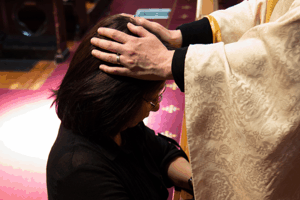This year at the Cathedral, we’re offering preparation for the Sacrament of Confirmation, the Laying on of Hands by the Bishop. The programme outline is here. The goal is age-old, to bring those who seek strengthening in the Faith by the Holy Spirit into closer relationship with God and with the rest of the Church. But the approach this year is different. Recognizing what Confirmation really means in our Anglican tradition, we’ll be employing a mentor model which should add an exciting dimension to what may have been in the past a somewhat mundane attempt at enlivening faith. Making disciples will be our primary goal.
The goal is age-old … But the approach this year is different.
We’ll recognize that those who are preparing for confirmation are members of the “Catechumenate.” The process will include various components:
- “classes” where all gather for a time of instruction and discussion;
- “sessions” where confirmands and mentors will meet for a more one on one experience of conversation on topics reinforcing some of the class material;
- supplementary activities like an “instructed” eucharist, a Cathedral tour, or mission field trip(s) to explore what it means to put faith into action.
We are also excited about the involvement of the Anglican Parish of New Maryland as they partner with us in this ministry this year. The Report of the Fredericton Archdeaconry Commission in 2012 (Supplemental 2013) encouraged Fredericton area parishes (Fredericton South Cluster) to work together to build relationships, share resources and more fully exemplify the Church as One.
The teaching customarily part of confirmation preparation (or confirmation classes) is the Catechism (page 544-555 Book of Common Prayer). In times past, this “instruction” has been minimally a simple memorization of the contents of Catechism. In contemporary times, we’ve come to understand traditional methods of “learning” are less than effective and would look now to other educational methods that better lend themselves to deeper learning experiences. No area of our lives could benefit more from these newer ways than our knowledge and understanding of our faith.
What is Confirmation?
Confirmation is one of the rites of Christian initiation. Once thought of as a completion of Baptism, we now more commonly look to Confirmation as representing the event at the age of discretion when we make a profession of the faith that was made for us at Baptism, probably as an infant. Confirmation does not complete our Baptism, as we become full members of the Church when we are baptized. Confirmation is an opportunity to confess the faith personally. Confirmation is but one more step in the life-long process of becoming disciples.
Will you who witness these vows being made do all in your power to support these persons in their life in Christ?
What’s our part in this process?
At the time of a baptism, the congregation is asked a very pointed question: “Will you who witness these vows being made do all in your power to support these persons in their life in Christ?” We answer: “We will.” Unfortunately, for many of us, that’s the last time we think of the answer. But the community of faith has a responsibility of nurture and support for those individuals. That will be expressed through the participation of mentors this year, who will carry a burden of that support on behalf of the congregation. We all also have a responsibility to pray regularly for those who are part of the Catechumenate. On Sunday, 28 February we’ll officially admit confirmands, parents and mentors to the Catechumenate.
If you would like to explore more fully what a renewed emphasis on the Catechumenate could mean for the life and faith of the Church or have been lead simply to be asking what this is all about, several articles are available, all on the Anglican Church of Canada website:
Making Disciples
What Is the Catechumenate?
The Ritual Shape of Catechumenal Ministry
Custom Designing the Catechumenate for your Parish
